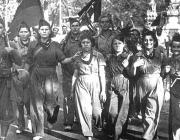European syndicalism and the IWW
A 1933 reply by Ralph Chaplin to, seemingly, Spanish anarchist Maximiliano Olay, about the differences between the CNT and the IWW.
Conflicting Strains in Anarchist Thought
GEORGE MOLNAR lectures at the University of Sydney. His article
is based on a paper delivered at the annual conference of the Australian
Student Labour Federation.
Russian anarcho-syndicalists commemorate the Spanish revolution
A group of activists of the Russian section of the International Workers' Association (IWA-AIT) worked together to organize an exhibit and the presentation of scientific papers to mark the 80th year since the Spanish Revolution. The venue was the Centre of Social and Political History (GPIB, a branch of the State Public Historical Library) in Moscow.
Aspects of syndicalism in Spain, Sweden and USA - Philip Holgate
A look at revolutionary and anarcho-syndicalism in three countries with sizeable syndicalist organisations in the 20th century.
Announcing the Anarcho-syndicalist Initiative
The Future And The Workers. Slave State or Anarcho-Syndicalism? by Albert Meltzer
The economic crises following the last war brought a series of revolutions, none of them successful, and in the long run, ruined the revolutionary movement. Not only was revolution unsuccessful but the revolutionary movement that had been built up under pre-war conditions became, eventually, the shock-troops of the enemy.
A new age begins in Spain - Pierre Besnard
Preceding the French Syndicalist delegation composed of member of the C.G.T.S.R., and the C.G.T., I wen t to Puigcerda on Dcecmber 10, together with some comrades from the Local Federation of Barcelona and the Regional Confederation of Catalonia. The welcome organized by our friends in Puigcerda was most cordial.
Anarchosyndicalism against fascism: a response to recent insinuations
The Revolutionary Syndicalist Committees in Spain - The history of the revolutionary syndicalist tendency of the CNT (1919-1925) - Comités Syndicalistes révolutionnaires
An account of the rise and fall of the CNT’s Revolutionary Syndicalist tendency—said to reflect the “original” orientation of the CNT of 1910-1918, modeled on the CGT and the "Charter of Amiens", as opposed to the “sectarian” anarchosyndicalist “deviation” that first arose in the CNT in 1919 as a result of the post-war crisis—featuring the “Declaration of Principles” and “Manifesto” of the Revolutionary Syndicalist Committees (founded in 1922), and discussions of the debates in the CNT concerning the Russian Revolution, the Third International, the Red Trade Union International, how to respond to repression, the question of violence, and the campaign for the trade union united front.
Anarchism and syndicalism - Salvador Seguí
A speech delivered in prison in 1920 by Salvador Seguí, a major, and complex, figure in the early history of the CNT: a proponent of alliances with other trade union and political groups, yet also a militant strike leader who spent years of his life behind bars; an opponent of unconditional membership in the Red Trade Union International in 1919, yet also a supporter of the CNT’s 1922 Zaragoza Declaration, according to which the “totally revolutionary” CNT is “absolutely political” by virtue of its far-reaching social goals; an advocate of more intellectual training for trade union militants and a harsh critic of the increasingly more popular exemplary actions, he was assassinated in 1923.











 Can comment on articles and discussions
Can comment on articles and discussions